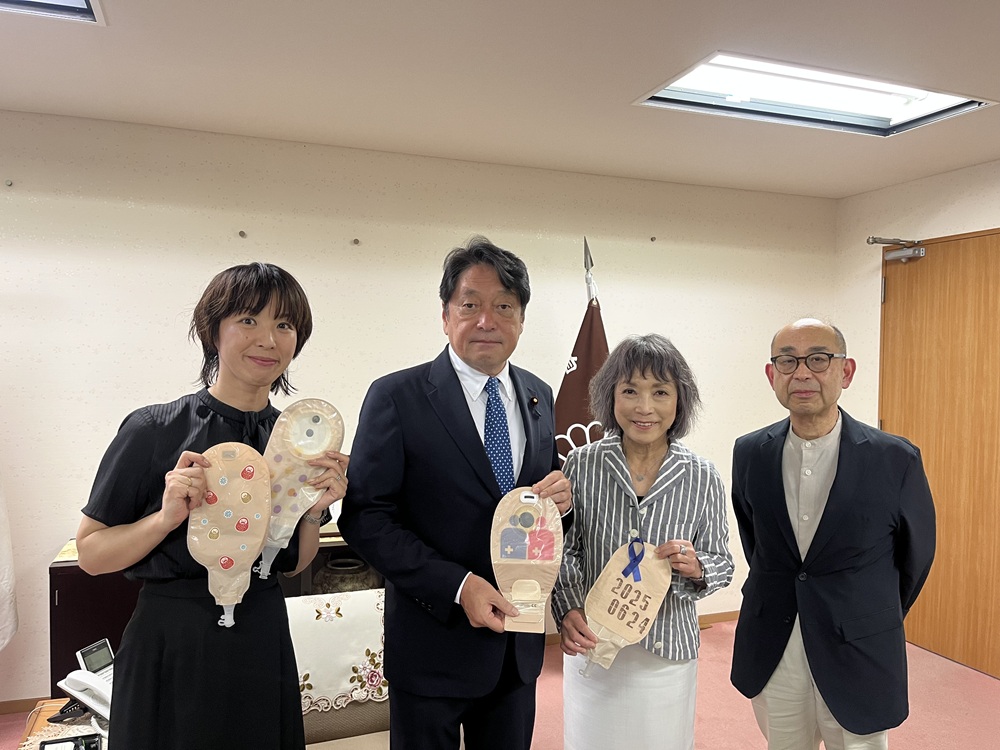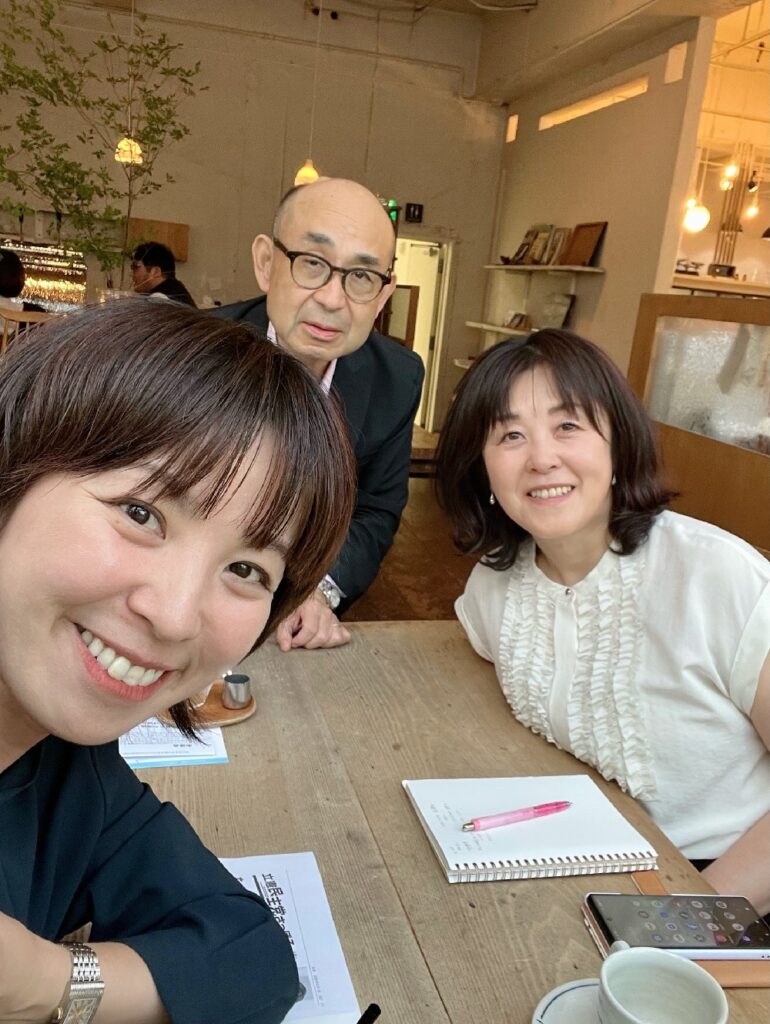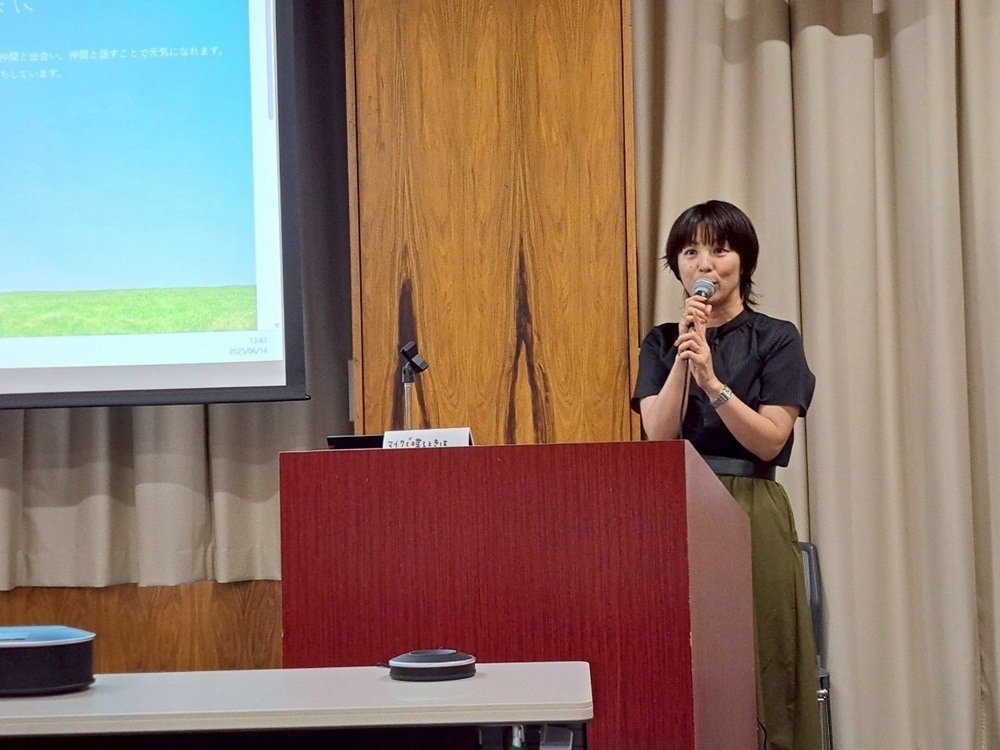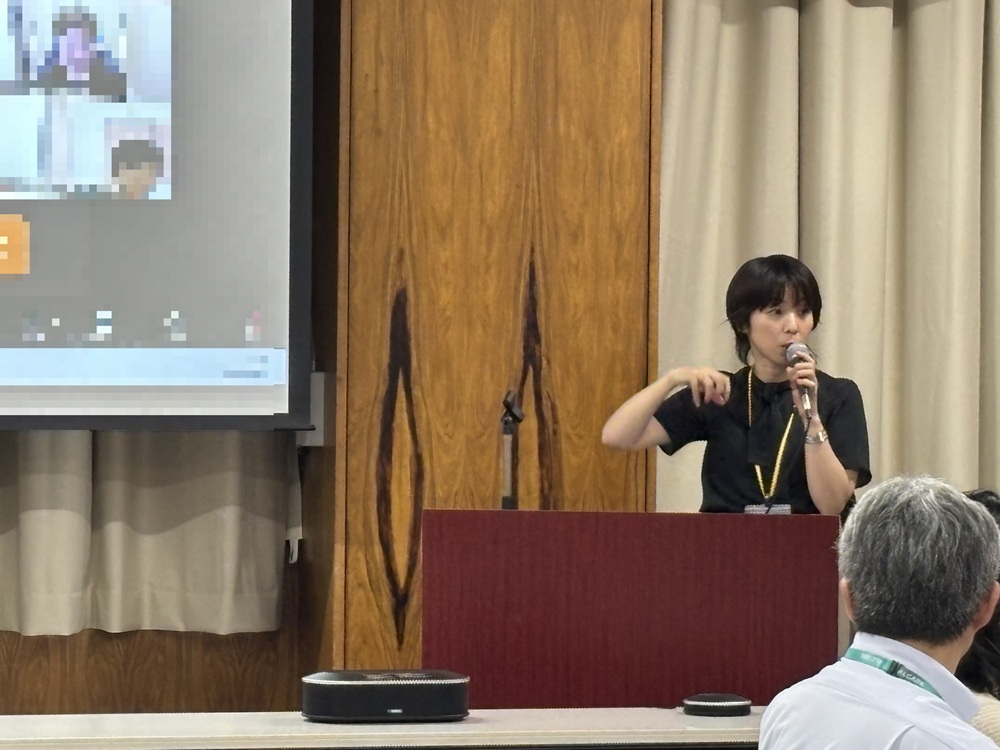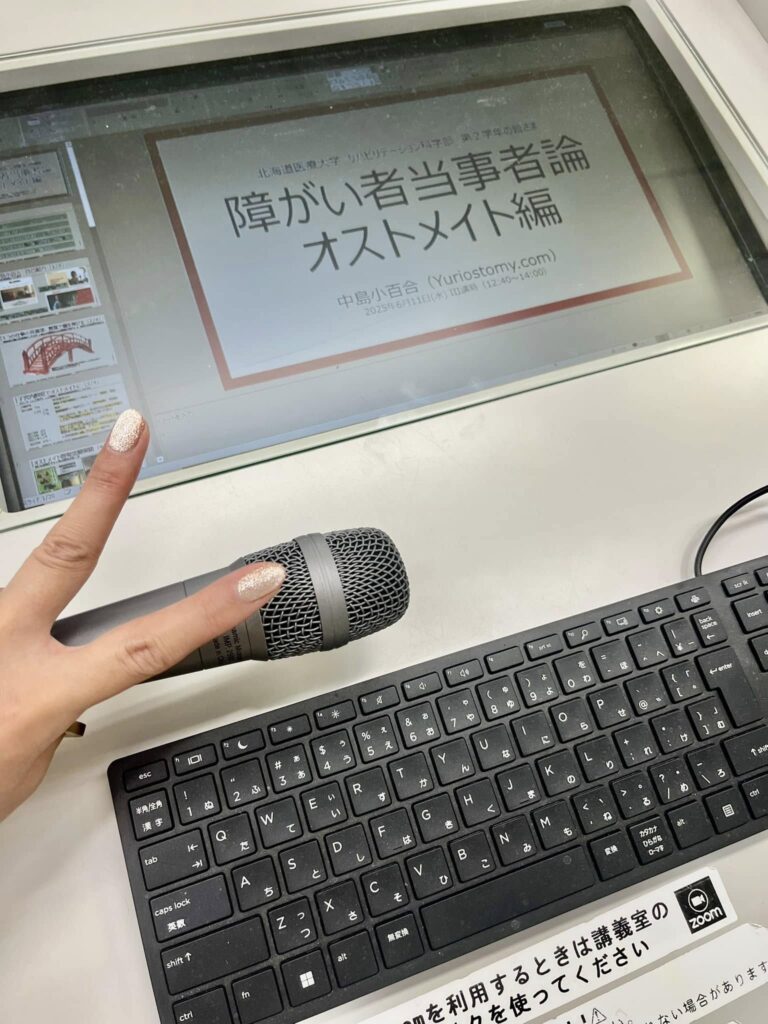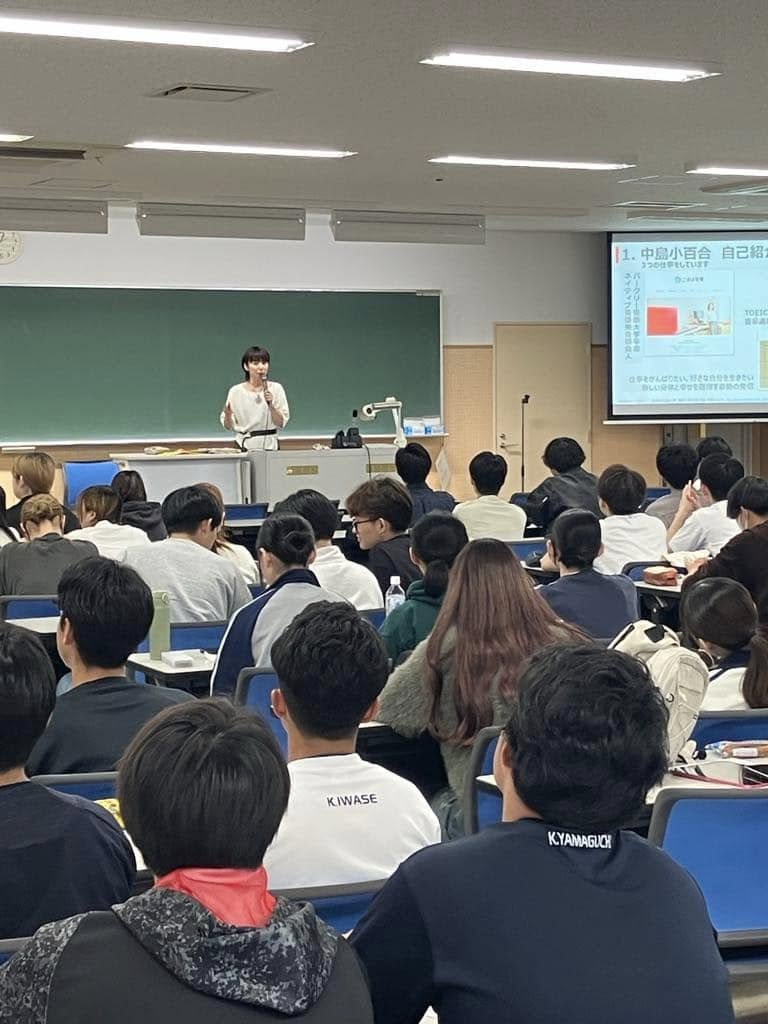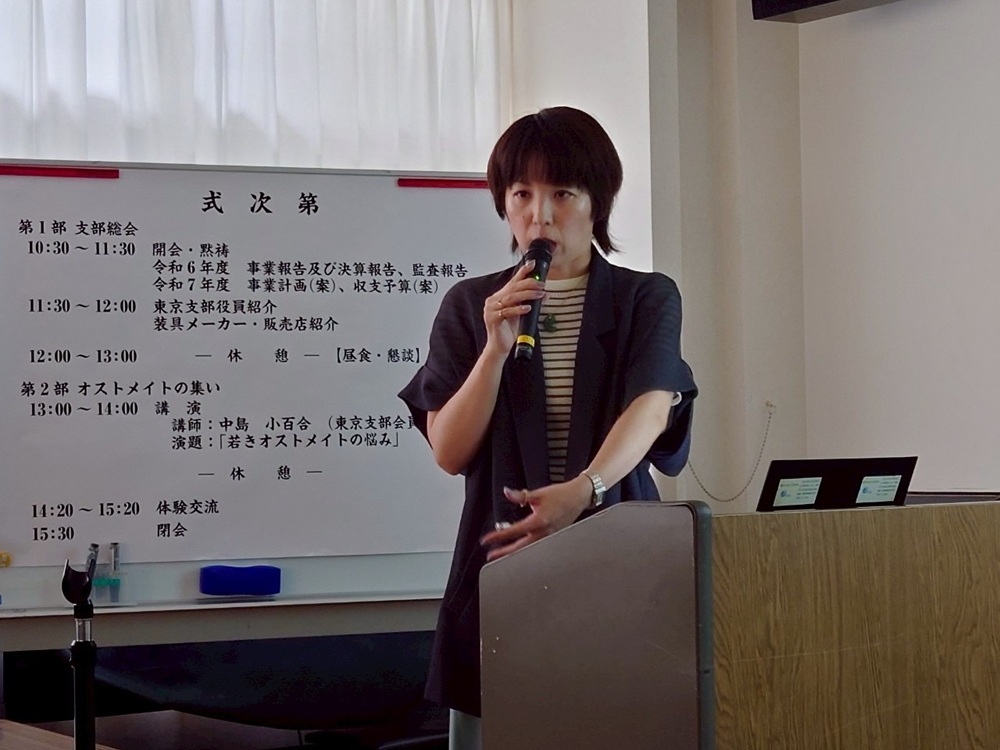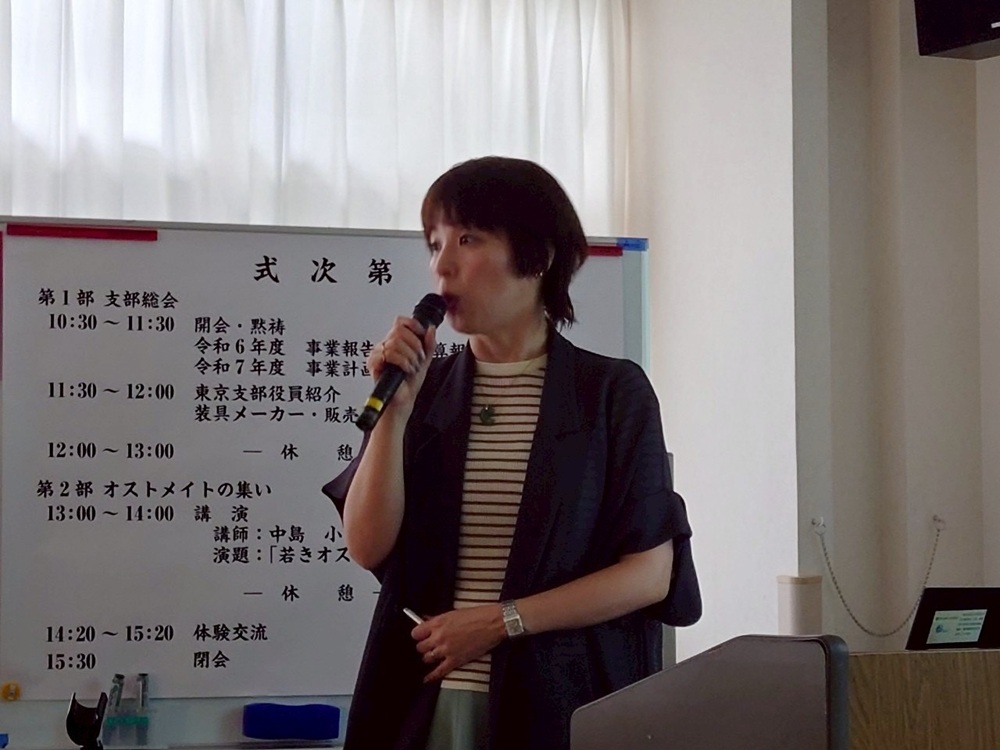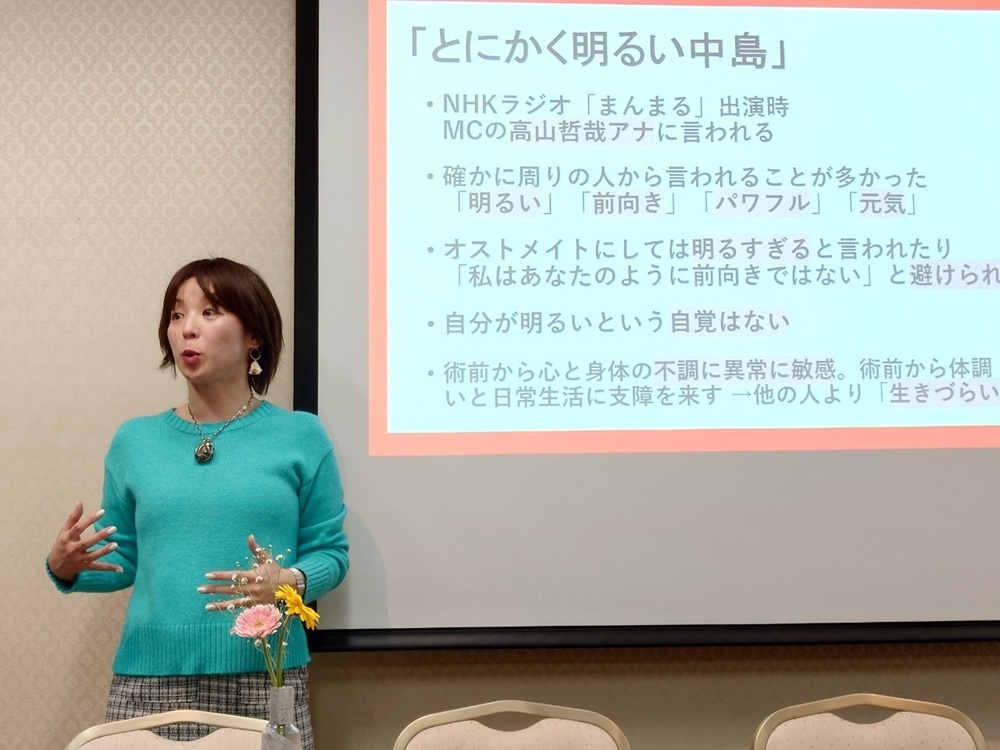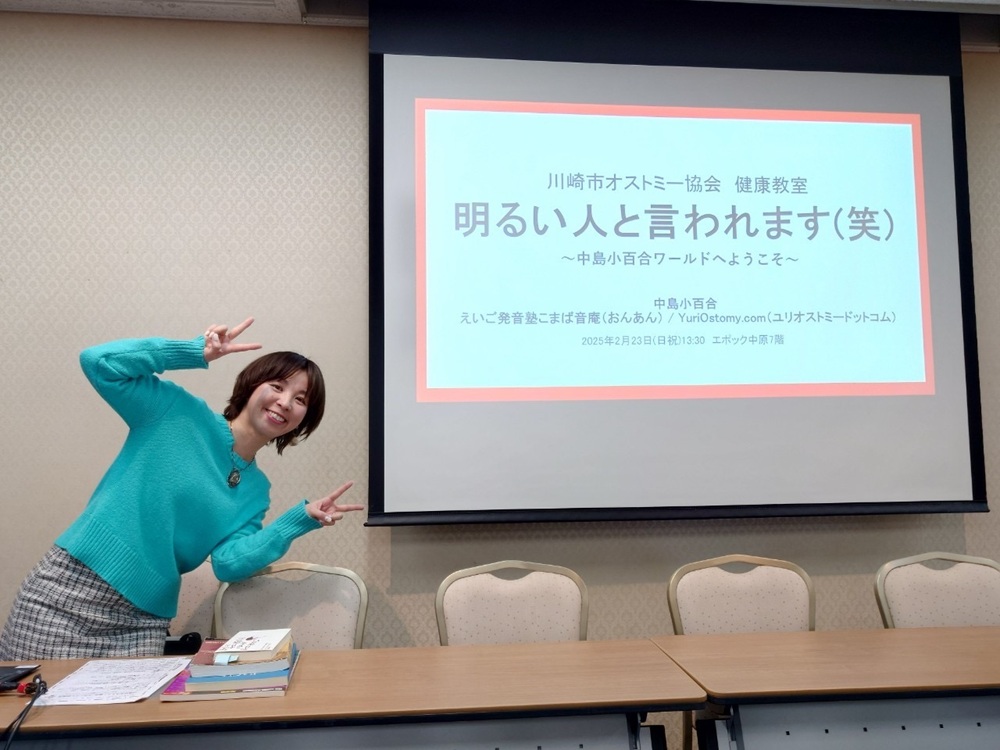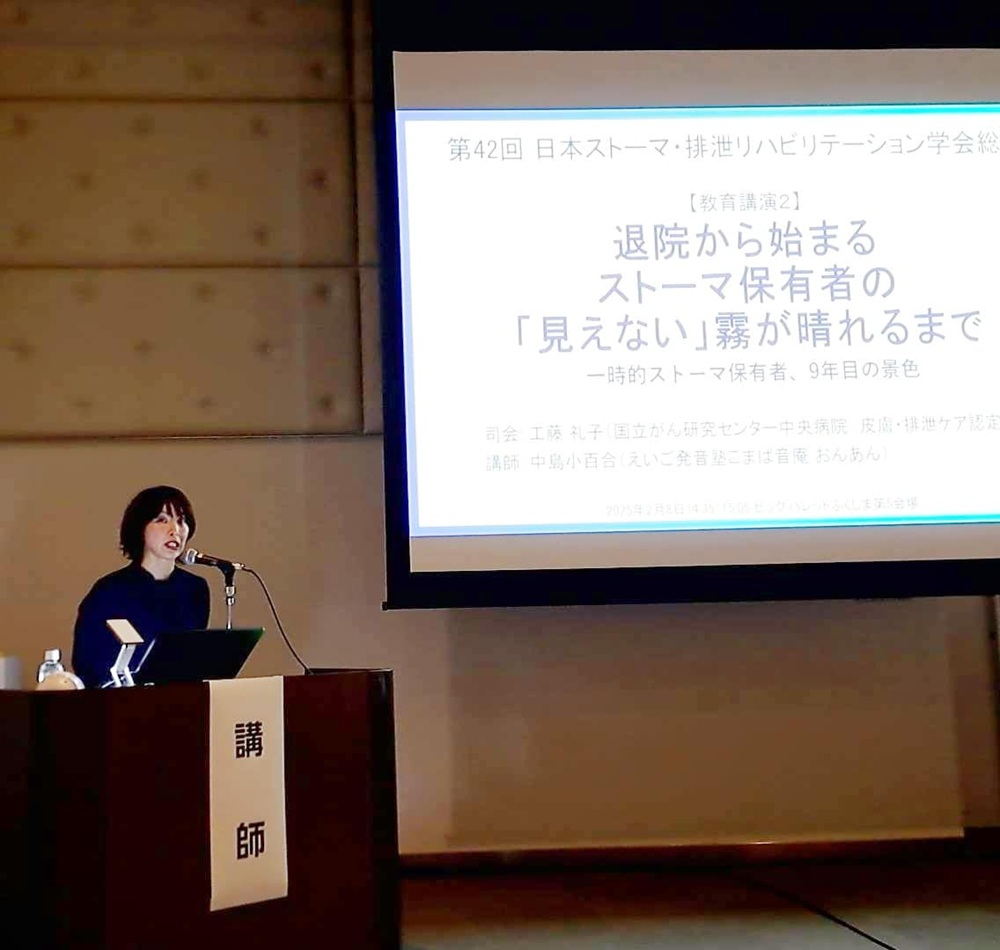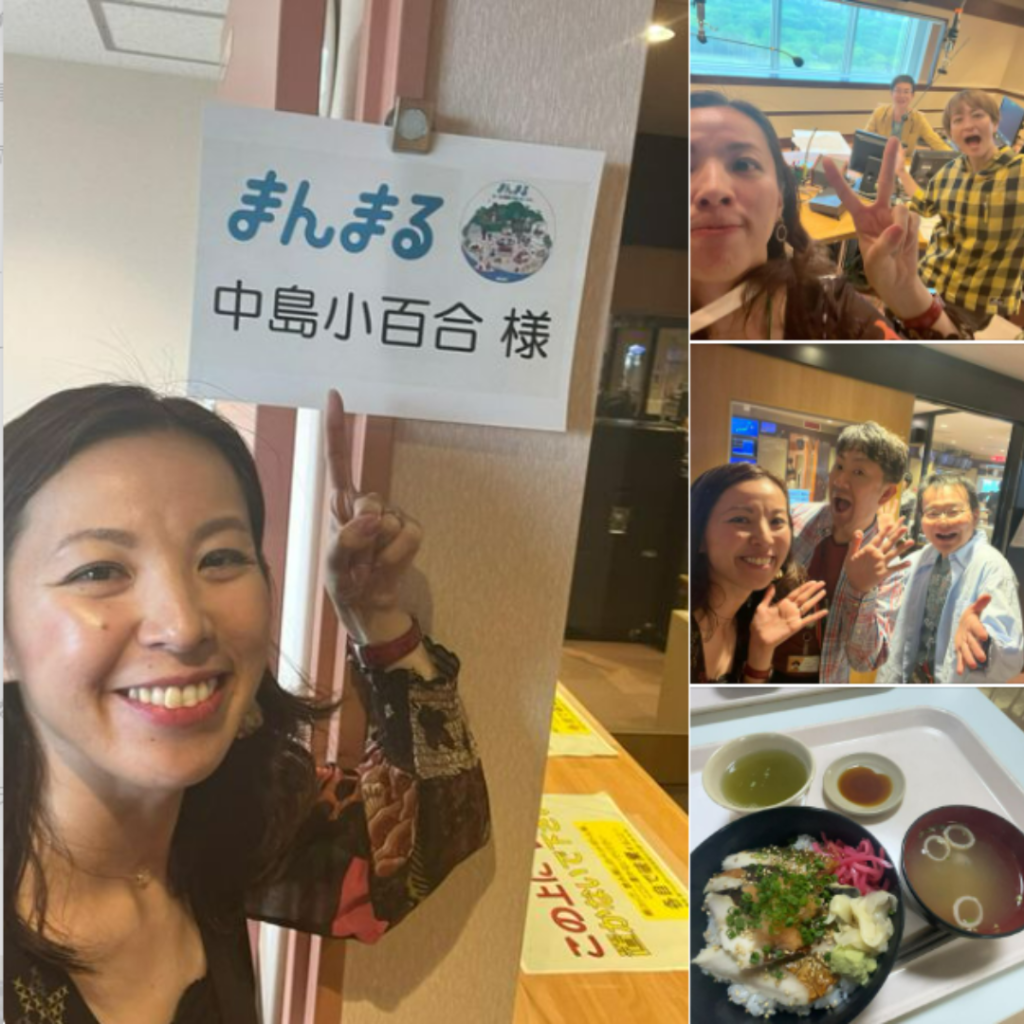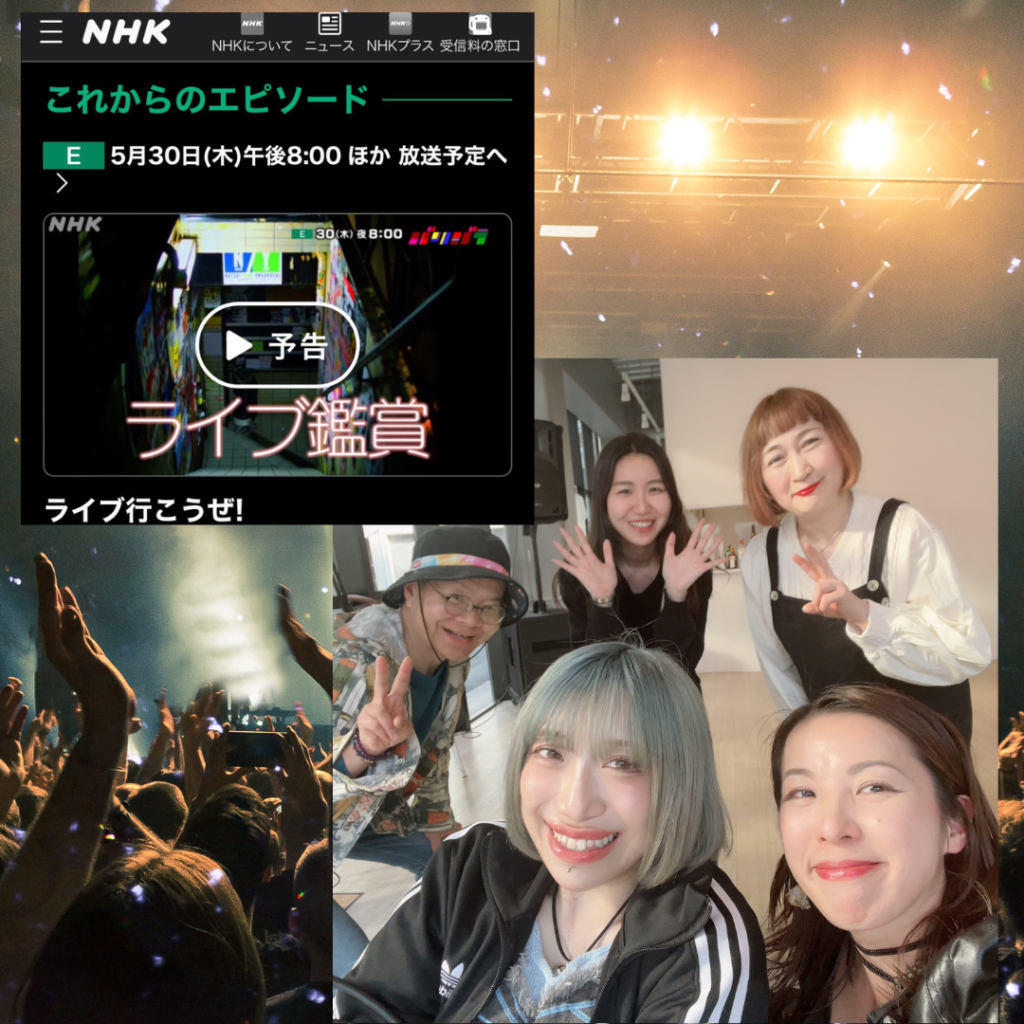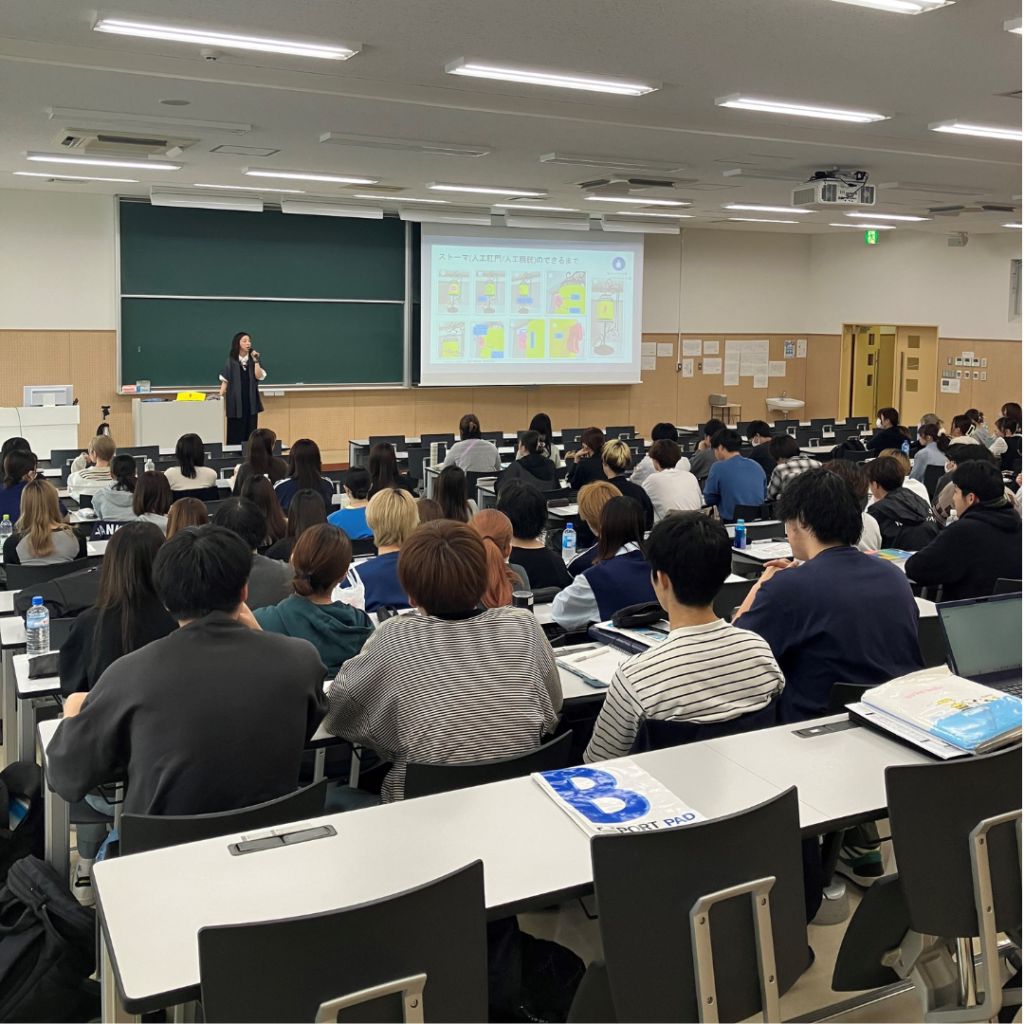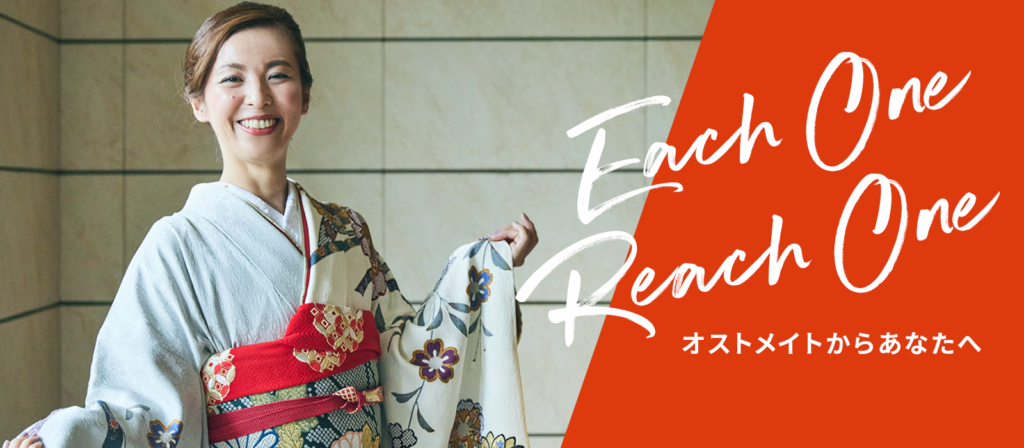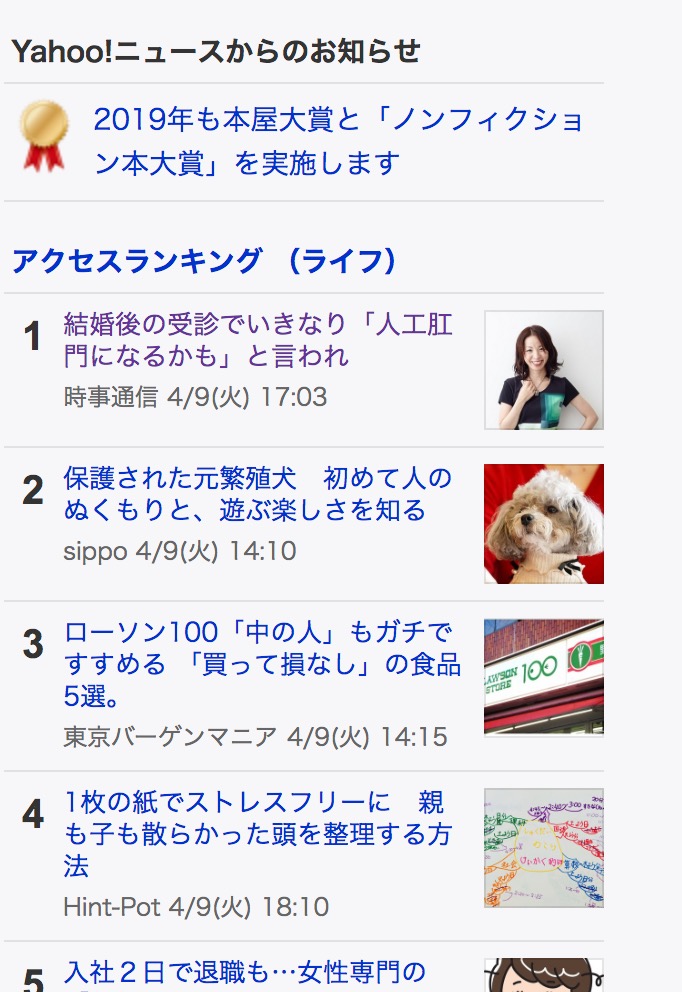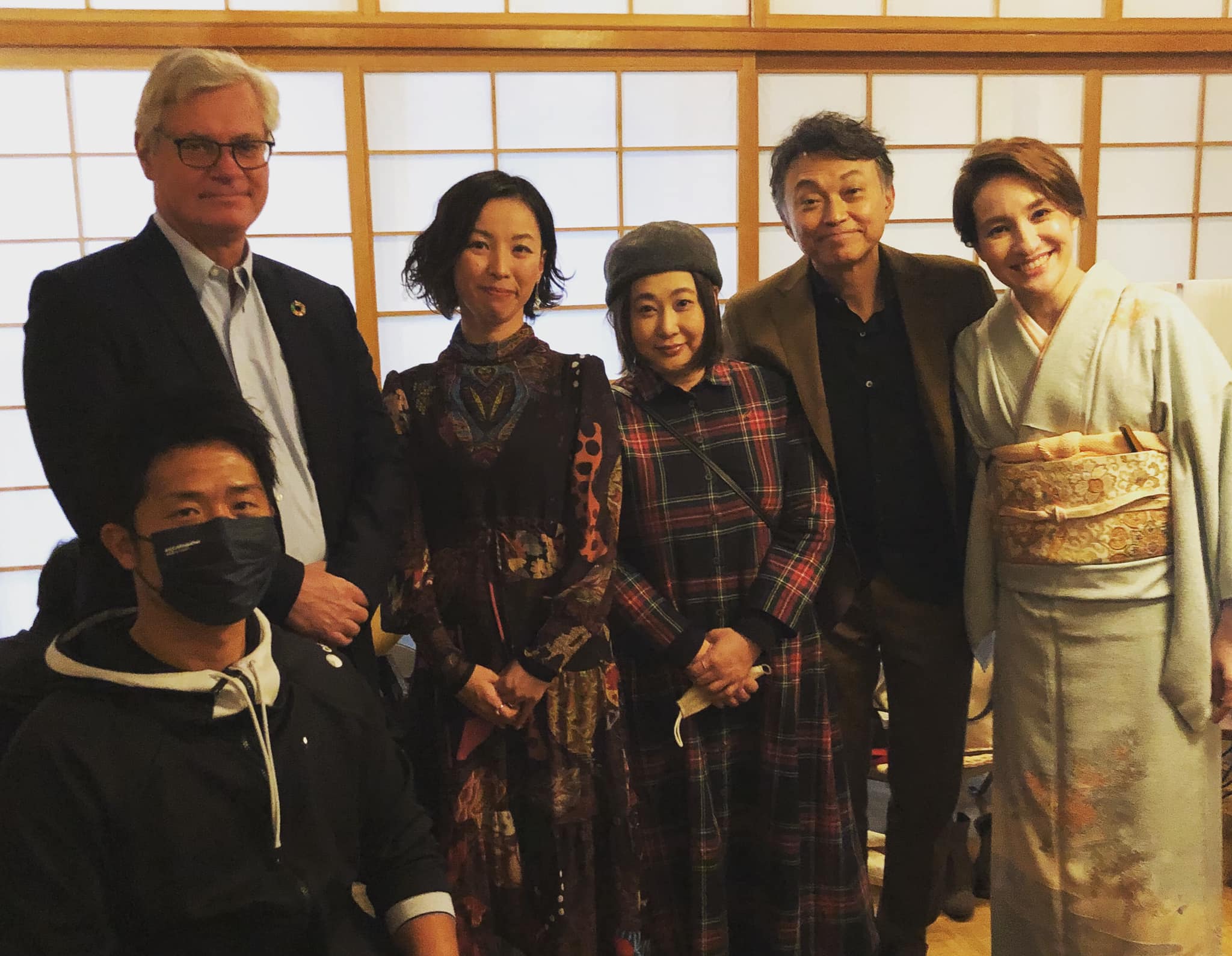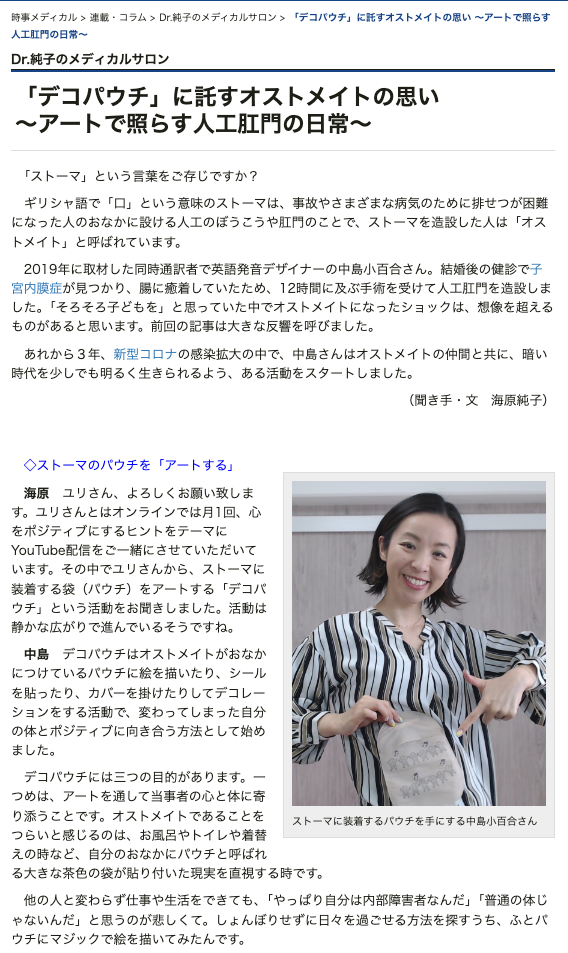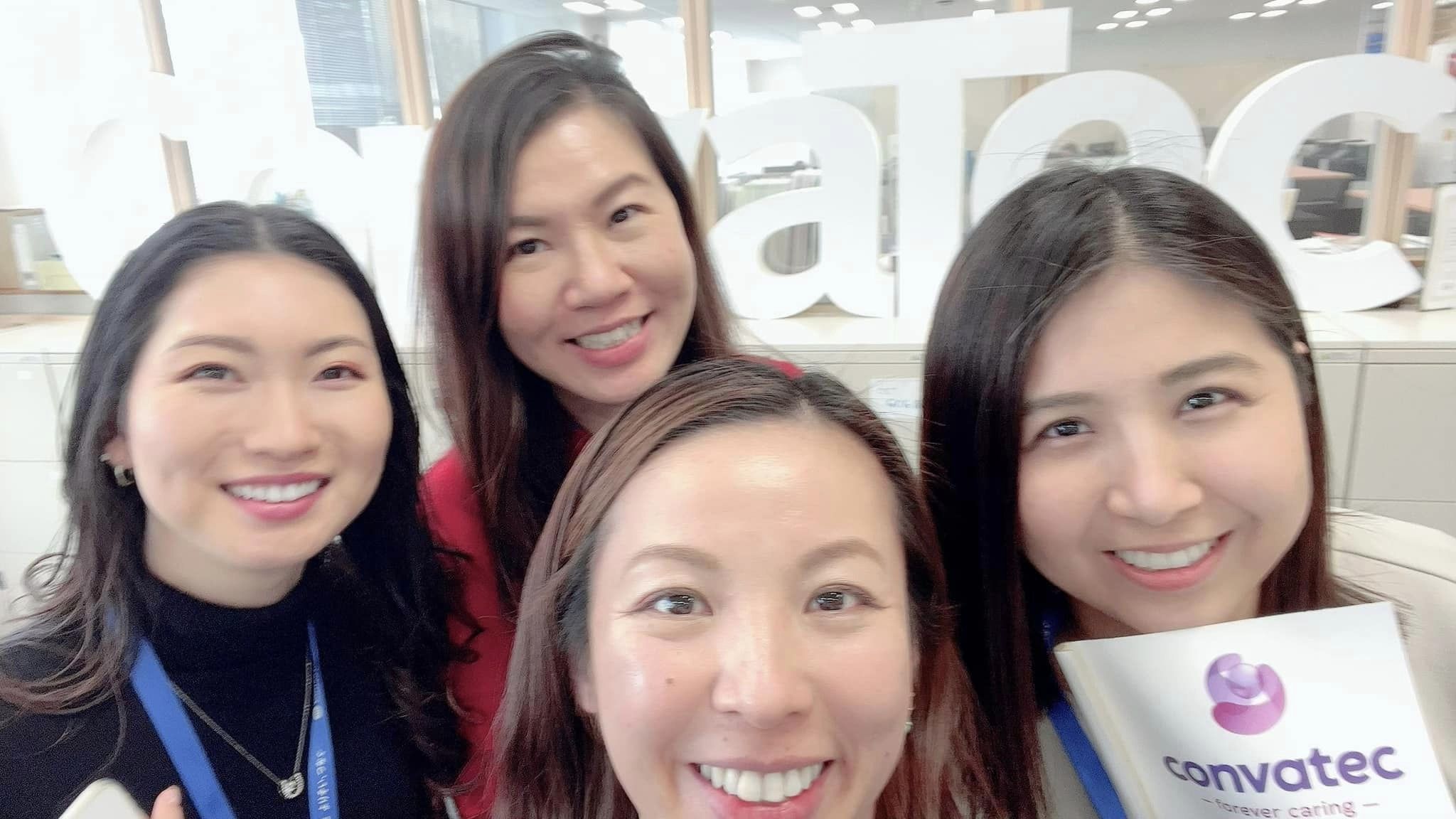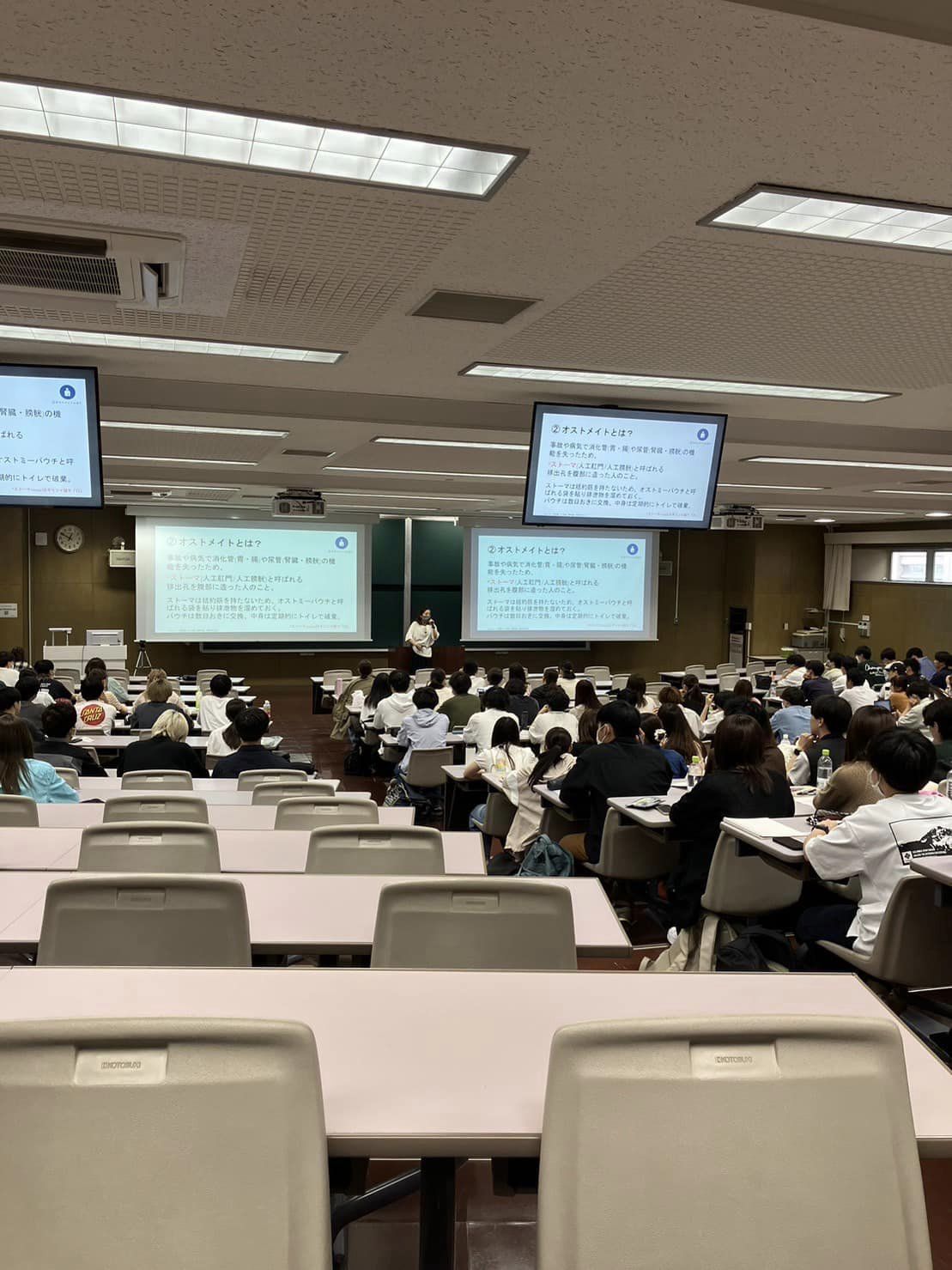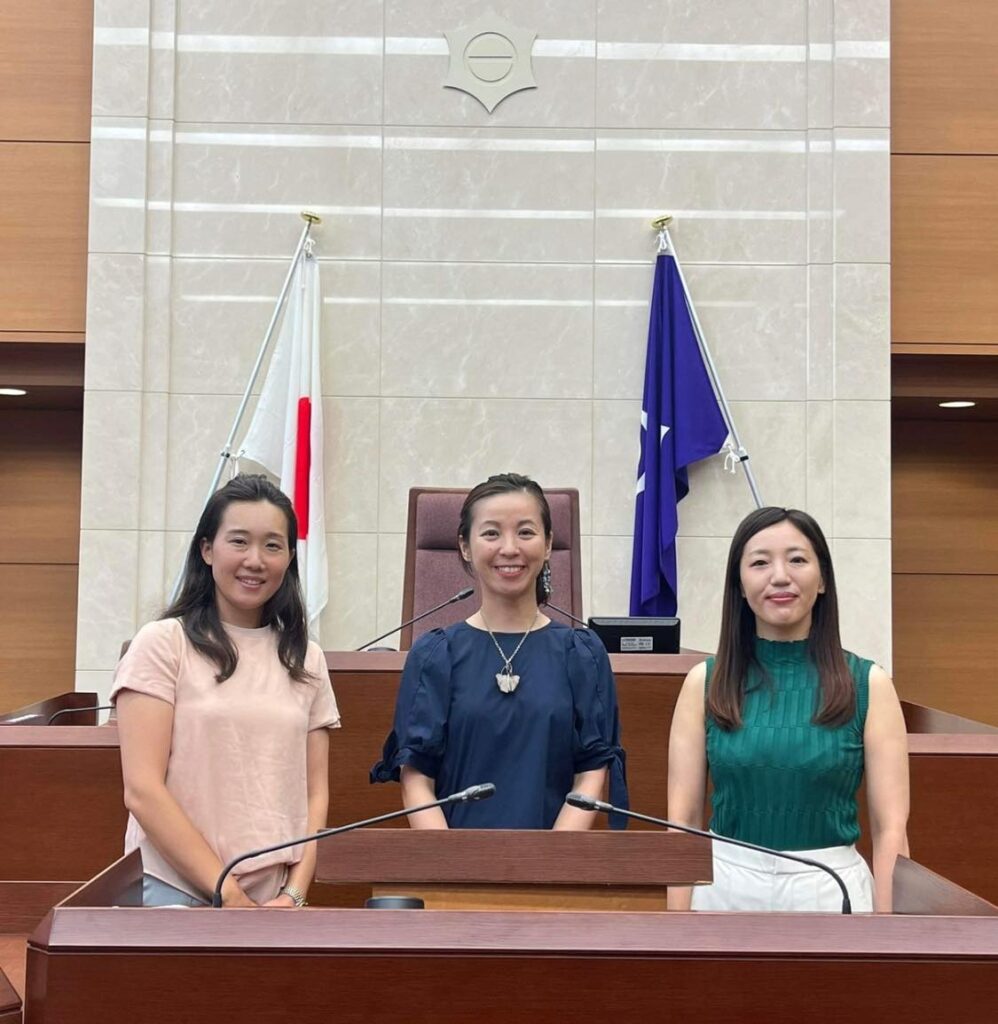こころの避難訓練
病気とは無縁だった自分の体調がみるみる悪くなり、ストーマ(人工肛門)がおなかに造設された時。手術のおかげで痛みや辛さからは解放されたものの、劇的に変わった自分の身体に心がついていかず悩みました。
手術から何年経っても、オストメイトという身体にしょんぼりすることはあります。急にストーマのケアが必要になり、焦って予定をやりくりすることもあります。体調の乱高下で思う通りに仕事が進まず、悔しい思いをすることもあります。でもそれは、オストメイトだけに限ったことではありません。
けがや病気や年齢などの事情で、身体や心に生きづらさを抱えることは誰にでも起こります。育児、看病、介護などで、家族のケアや仲間のサポートにまわる場合もあるでしょう。そんな「まさか」の時、自分がどんなことを考え行動をするかはその方がそれまでに経験してきたこと、見聞きしてきたものによって大きく変わります。
地震の多い国に住む私たちにとって、定期的に非常持出袋をチェックしたり、自治体の避難訓練に参加することは日常の延長になりました。
同じように「こころの避難訓練」として当事者のストーリーを聞き、少しだけ自分や家族の「もしも」について考える機会を持つ機会があれば、万が一心の揺れるできごとが起きた時にも自分なりのベストな判断を選び取れるはず、という想いから、自分の経験やオストメイトについて講演や講義でお話させていただいています。また、司会進行やイベント通訳のお仕事もお請けします。詳しくは「お問合せ」よりお気軽におたずね下さい。
講演・講義でお話できること
※いずれの講義も、日本語、英語の両方でお話できます。
オストメイトについて楽しく学び、内部障害者への理解を深める内容です。過去の講義では学生(小学生~大学生)を対象に、年齢や専攻に応じて難易度や内容を調整しながら講義を進めます。
初めまして、オストメイトです
たとえば大学の講義ではクイズ形式で「この姿勢や行為はオストメイトにできるかできないか」を答えてもらったり、ご家族に闘病経験があるお子さんがいた小学生むけ講座では(腸の代わりに)水道管のイラストで人工肛門について説明をしました。
特に他人や自分の見た目に対する感覚が繊細になる前の子どもたちは、心と身体の多様性を知ることで未来の自分を大切にする気持ちを育てることもできます。「どんな見た目や機能でも、自分の心と身体を大切にすることが一番大事」というメッセージが伝わるようお話させていただいています。
「みんなと同じ」の外で見つけた宝物
学歴も仕事も身体も、途中まで「みんなと同じ」だったのに、いろいろな事情でそこから外れてばかりの人生について嘘なくお話します。
セカンドチャンス(1度失敗した後に挽回する機会)がなかなか与えられない社会で、いじめを受けて周りの目が怖くなり、留学先の音大で歌と英語とボディ・ポジティブ(体型や傷のあるなしに関わらず、ありのままの自分の身体を前向きに捉えるスタンス)を学び、結婚直後に病気で障害者になり、大きく変わってしまった身体をどう乗りこなせば仕事を続けられるかを模索、というストーリーをひも解きながら、一見無関係に見える出会いや出来事が思わぬ形で自分のピンチを救う宝物になる、というメッセージを届けます。
当事者をとりまく言葉のはなし
音楽関係の通訳/翻訳や、英語発音の指導など、「ことば」に関わる仕事をする者として、オストメイトをとりまく言葉について思うところがあります。また、術後の新しい身体との付き合いを模索するなかで、心のモヤモヤを文字や言葉にすることが揺れる感情の整理に役立った感覚があります。
手術で自分のおなかについたものを「人工肛門」と呼ぶか「ストーマ」と呼ぶかというだけで、当事者である自分の心のありようは大きく変わります。英語話者に「日本ではストーマを人工の肛門(artificial anus)って呼ぶんだよ」と言うと顔色を変えて驚いたり怒ったりするので、私が言葉に繊細すぎる、ということでもないようです。私は入院した「大腸肛門外科」という科の名前が人に伝えられず、お見舞いに来たいと言ってくれた友人たちを病室に迎えることが出来ませんでした。
自治体によっては、定期的に提出する書類に「畜便袋」「畜尿袋」と書かれたものが当事者に届くことすらあります。その書類を見るたび心が沈むので、地元の議員さんに事情を相談したところ「畜便袋」の表記を「ストーマ袋(消化器系)」と変更してくださいました。それでも他の自治体では同じことが起こっているのではと思うと、オストメイト当事者の自己肯定感を下げる言葉づかいにまず当事者が意識的になるべきでは、と感じます。
精神分裂病が2002年に統合失調症に、痴呆症が2004年に認知症と名称変更され、2023年に糖尿病をダイアベティスと呼ぶことが提案されたように、オストメイトをとりまく言葉づかいを変えることで当事者のスティグマ(周囲からの否定的な意味づけや不当な扱い)の解消を応援します。オストメイト当事者が術後の新しい身体とうまく付き合い、恥ずかしいと感じる気持ちを軽減し、助けを求められない、当事者同士の交流を避けようとするなどの孤立を防ぐことにつなげるため、お話させていただきます。
あたらしい「ふつう」の作り方
障害者として可哀想がられるのは窮屈。
健常者から「こんな身体でも頑張っている人が居るんだから、私も頑張ろう」とポジティブの踏み台にされるのも不愉快。でももう健常者ほどの体力はないので、昔のような徹夜続きの激務ができないのも事実。
私にとっての啓発活動はあくまでも同じ障害を持つ人や、心や身体に生きづらさを持つ人を応援するための活動。本業の合間で誰かの役に立てるなら喜んでお話させていただくけれど、フルタイムの啓発活動家になりたいわけではない。
身体や心の変調で生活を変える必要が出た時でも、普通に仕事を持ち、障害を売り物や見世物として使わず、できることは頑張り、できないことは助けを求め、やりたいことは「どうしたらそこに近づけるか」を考えながら少しずつ前に進んでいく。価値観の違う人と意識的に対話をしながら、自分の思い込みや他人への決めつけを修正する。
障害のかたちは人それぞれで、その障害とどう生きるかは1人ひとり全く異なります。周りに流されず、偏見やプレッシャーに揺れず、自分なりの「ふつう」を活き活きと過ごす人がもっと増えるように、等身大のオストメイトとしての日々をお話します。
講演、講義、対談の実績
- 2025/08/22 文京区の学童にて オストメイト啓発講座&デコパウチワークショップ開催
- 2025/06/14 公益社団法人日本オストミー協会 北海道全国大会にて講演「現役世代が選ぶ!推し装具選手権」写真写真
- 2025/06/11 北海道医療大学 障がい者当事者論講義 写真写真
- 2025/05/25 公益社団法人日本オストミー協会 東京支部にて講演「若きオストメイトの悩み」写真写真
- 2025/02/23 公益社団法人日本オストミー協会 川崎支部にて講演「明るい人と言われます」写真写真
- 2025/02/08 第42回 日本ストーマ・排泄リハビリテーション学会総会にて講演「退院から始まる、ストーマ保有者の『見えない』霧が晴れるまで ~一時的ストーマ保有者、9年目の景色」写真
- 2024/11/30 ブーケ<若い女性オストメイトの会>25周年記念オンライン会にて講演「世界で輝くオストメイツ(仲間)20人」
- 2024/10/20 コンバテックMe+クラブにて講演「中島小百合はオストメイトきっかけで社会をやさしくしたい」
- 2024/07/20 Ostomate’s Café for Ladies Vol3 講演「手術後の家族とのつながり:夫に直接聞いてみた」
- 2024/06/20 北海道医療大学 障害者当事者論講義 写真
- 2023/09/30 コンバテック ジャパン株式会社 コンバテックme+クラブ交流会 ゲストスピーカーとしてトークセッションをファシリテート
- 2023/06/28 北海道医療大学 障害者当事者論講義
- 2023/05/26 コンバテック全社会議で当事者スピーチ
- 2023/05/01 クリニカル・エクササイズ・スペシャリストのサラ・ラッセル氏、山本悦秀氏との鼎談とオフショット
- 2023/02/15 コンバテック・ジャパン株式会社 海外スタッフさんと意見交換
- 2022/11/19 コンバテックme+クラブ交流会 2022autumn 声優 真山亜子さんと パネルディスカッション出演
- 2022/09/15 北海道医療大学の学生むけにオンラインでオストメイト講義とデコパウチワークショップ(イーキンジャパン株式会社協賛)
- 2022/08/22 ライト学童保育クラブでの オストメイト啓発講座 (コロプラスト株式会社協賛)(コロプラスト株式会社 情報誌「結人(ゆうじん)」Volume 28に掲載)
- 2022/05/10 北海道医療大学 障害者当事者論 講義(オンライン)
- 2022/4/29 SlowNews(Webメディア)「たとえばウンコで未来を語る」インタビュー出演(報告投稿)
- 2022/03/16 時事メディカル「Dr.純子のメディカルサロン」「デコパウチ」に託すオストメイトの思い~アートで照らす人工肛門の日常 インタビュー出演
- 2021/12/13 コロプラスト株式会社主催 デンマーク大使館でのイベントに参加(告知投稿)(報告投稿)コロプラスト情報誌「結人」第24号、第25号で掲載
- 2021/04/17 医療の質の向上と患者のQOL(生活の質)向上に寄与することを目的としたNPO法人 m-akt(エムアクト)のYouTubeチャンネル「オスとぴ」オストメイトインタビュー出演
- 2021/04 コロプラスト株式会社 情報誌「結人(ゆうじん)」22号に出演
- 2021/03/27 VCA(ボイスコミュニケーティング協会)YouTube インタビュー出演
- 2021/01/29 TOTO Webコラム【ユニバーサルデザインStory】車いす使用者、視覚障がい者、オストメイト。withコロナでの意識の変化と”非接触型”水まわり商品について考える インタビュー出演
- 2019/04/15 毎日新聞日曜版「新・心のサプリ」今、できること2019/04/09 時事メディカル「Dr.純子のメディカルサロン」一流のレジリエンス~回復力~結婚後の受診でいきなり「人工肛門になるかも」と言われ インタビュー出演
- Aimed at educating what ostomy and internal disabilities are
- Contents and talking points are adjusted according to the audience (from elementary schools to universities)
- Lecturer 07/20/24
Ostomates’ Café for Ladies Vol.3 (online)- Conducted a live interview with my husband on post-op partnership dynamics after my ostomy surgery
- Lecturer 06/20/24
Health Sciences University of Hokkaido / Hokkaido- “Disability Advocacy and Lived Experience” see picture
- Guest speaker 09/30/23, 06/03/23, 11/13/21
Me+ Club / Online- online networking event hosted by Convatec Japan
- Ostomy advocate 05/18/23
Convatec / Town hall meeting (online)- Delivered a speech explaining the situation surrounding ostomates in Japan at a town hall meeting attended by all branches of Convatec
- “Patient perspective/ Sayuri Nakajima”
- Panelist 05/01/23
Convatec Japan / Tokyo, Japan- Participated in a panel discussion with Ms. Sara Russell (clinical pilates instructor; ostomate) and Dr. Etsuhide Yamamoto (dentist; ostomate)“Exercising with stoma” See picture
- Product consultation 02/15/23
Convatec / Online- Exchanged perspectives with their Global marketing team See picture
- Panelist 11/19/22
Convatec Me+ Club / Online- Participated in a panel discussion with voiceover artist Ako Mayama at an Autumn networking event.
- “Stoma tips for going out/ traveling”
- Lecturer and Workshop leader 09/15/22
Health Sciences University of Hokkaido / Online- Gave an online lecture at an ostomy and Deco-pouch workshop (Supported by Eakin Japan KK)
- Interviewee 4/29/22
SlowNews / Web magazine- Featured interview “Predicting the Future with Poop” series
- Interviewee 03/16/22
JIJI PRESS / Online journal- Appeared on the medical web article “An ostomate’s wish conveyed with a deco-pouch”, an interview by psychosomatic medicine physician Dr. Junko Umihara See the article
- Guest Speaker 12/13/21
Coloplast Japan / Danish Embassy, Tokyo- Appeared at an event held at the Danish Embassy The event was also featured at Coloplast Japan’s official magazine Yujin vol. 24 and 25 See the photo
- Interviewee 04/17/21
M-AKT / Online- Appeared in an interview on non-profit organization M-Akt’s official YouTube channel
- Interviewee 04/21
Coloplast Japan / Print media- Featured on the cover photo and in an interview in Coloplast Japan’s official magazine, Yujin, vol. 22
- Interviewee 03/27/21
VCA / Online- Appeared at VCA, the Voice Communicating Association
- Interviewee 01/29/21
TOTO / Online media- Appeared on the web article “Universal Design Story” with Ms. Ayako Ozawa, a wheel-chair user, and Ms. Takako Ueda, a blind person
- Interviewee 04/09/19
JIJI PRESS / Online publication- Appeared on a medical web article entitled: “First-class resilience: being told that I might become an ostomate for the first doctor’s visit after the marriage”The article hit #1 on Yahoo! news ranking in Japan. See the photo
Fire drills for the mind
I got bowel endometriosis and went through ostomy surgery. Although I owe every single post-op pain-free day to my stoma, I couldn’t wrap my head around the huge change my body image had to face.
I still get overwhelmed by the gory look of my body from time to time. No matter how much time goes by, there are times when being an ostomate just hits me hard.
But is this a tribulation only ostomates have to face? No. Many others can bear physical or mental issues due to injuries, sickness, or just good old-fashioned aging. And even if you aren’t directly affected, you might suddenly find yourself being a primary caregiver for your family members or friends.
How we react to the unexpected depends on what we have been thinking and acting upon until that moment, and it is this philosophy that underlies the whole concept of us having a ridiculous number of fire drills at schools and workplaces here in Japan. Each household has their “go-bag” at home. They check it a couple of times a year, and participate in local fire drills.
If there were “fire drills for the mind” where people could hear the unique stories of those who have found themselves with physical/mental issues, we might be able to grasp the best option available were the unexpected and unprecedented to come our way.
Indeed, it did come my way. And with hindsight I can say, it would have been great to have known more, and been more open-minded about mental and physical health issues. It would have certainly helped me more quickly become accepting, as I have become, of the “new” me.
I offer speaking engagements and lectures on my journey with ostomy as well as emceeing and event translations. Feel free to send inquiries via the online form (https://yuriostomy.com/inquiries/)
Speech topics *offered in both English and in Japanese
Hi, it’s Yuri the Ostomate!
Introductory lecture about ostomy
At a university, I gave students a pop quiz asking whether each posture/activity is doable for ostomates or not.
At an elementary school, there was a student who was very sensitive about certain medical topics due to his/her family member’s medical issues. I used illustrations of water pipes to explain what ostomy is in a sensitive manner.
The treasure I found “off the beaten path”
Autobiographical lecture about embracing life’s little detours
I was the same as everybody else, going to school, getting a job, having a body that functions… but somehow I always seem to go down these odd little tracks…
In a society where a second chance is a luxury, I was bullied and became self-conscious. Fast forward a few years, and I was learning music and singing in Boston, becoming aware of how to open myself up and be creative. Then, I became a disabled person right after my marriage and struggled to find a way to live way comfortably after my world turned upside down.
Today, I will share my personal experiences, of how seemingly unrelated matters in the past strangely connect and, as it turns out, helped me to surf life’s unpredictable surges.
Words Matter: Terminology around ostomy and how it affect us ostomates
As someone working in the language field, I have all sorts of issues with the terminology used about and by Japanese ostomy community.
For instance, calling what I have “a stoma” or “an artificial anus” makes me feel very different, and very disabled. I still can’t believe that people in the industry still use the latter term in their literature.
Then there was the time I had to turn down all my friend’s requests as I laid in my hospital bed because I was embarrassed to be admitted to the Colorectal and Anal Ward.
Or how about local governments having ostomates sign documents with “stool storage bags” and “urine storage bags” written on them? It was so devastating that I actually reached out to a local politician and explained the situation. She changed the expression from “stool storage bags” to “ostomy bags (colostomy)”.
A certain wording can purge the dignity of the people who have to live with these named conditions. And that’s as true for ostomates as for other people with disabilities.
In my homeland of Japan, Schizophrenia was renamed from “splitted-mind desease” to “integration distorder”, in 2002, and dementia was renamed from “senile stupidity” to “cognitive impairment” in 2004. Now they’re trying to change the name “sugarly-pee desease” (diabetes).
I will be advocating for changing the terminology surrounding us ostomates to remove the stigmas we face. Any speaking engagements that encourage ostomates to deal with significant changes after surgery, easing the shame and the embarrassment, or that prevent them from being isolated without asking for help, will be greatly welcome.
How to find “what feels good to me” not “according to society.”
I accept no pity from the able-bodied.
I don’t feel comfortable being used as a stepping-stone, a boost for another stranger’s random positivity, either.
But my physical strength has deteriorated post-surgery. I just can’t pull the all-nighters I used to anymore.
Advocacy work for me is a humble individual project to motivate people with the same disability and/or any physical/mental struggles as they move forward. But while I am willing to speak up and out for people when I’m not teaching or translating, becoming a full-time advocate is not something I am thinking of.
Nobody should be forced into the social mould unless that’s exactly the shape they want to take. For me, improving in my professional field while not making a show of my disability, is what really matters.
I also like taking time to work on;
mourning what is lost properly
embracing the body and mind I have right now
doing my best but knowing when to pause and rest
setting goals and making them come true
asking for help before giving up
Each disability is different. How each of us deals with our struggles is different, too. We don’t have to bend over backward to please anyone. Let’s stay authentic to what we think and feel, and establish “what feels good for me“. My advocacy work will be a report, candid footage, the evidence of my exploration and experiments.
A truncated history of my work experience:
イベントや活動についてお問い合わせはこちらから
Contact me here for inquiries


